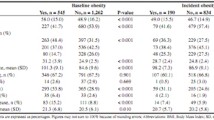Abstract
Recent findings suggest obesity is associated with reduced memory performance in older adults. The present study examined whether similar deficits also exist in younger adults and the degree to which the relationship between body mass index (BMI) and memory varies as a function of age. Prior to inclusion, participants were rigorously screened and excluded for medical conditions known to impact cognitive functioning, including neurological disorders, head injury, cardiovascular disease, and diabetes. A total of 486 healthy adults completed a verbal list-learning task. Participants were categorized into normal weight, overweight, and obese groups based on their BMI. Performance on learning, delayed recall, and recognition performance were compared across BMI groups. Results showed obese individuals had poorer memory performance when comparing persons across the adult lifespan (age 21–82 yr), but also when examining only younger and middle-aged adults (age 21–50 yr). Regression analyses found no evidence of an interaction between BMI and age on any memory variable, suggesting the relationship between BMI and memory does not vary with age. These findings provide further support for an independent relationship between obesity and reduced memory performance and suggest these effects are not limited to older adults. Further research is needed to identify etiological factors.
Similar content being viewed by others
References
Bray G.: Medical consequences of obesity. J. Clin. Endocrinol. Metab., 89, 2583–2589, 2004.
Mokdad A., Marks J., Stroup D., Gerberding J.: Actual causes of death in the United States, 2000. JAMA, 291, 1238–1245, 2004.
Stein C., Colditz G.: The epidemic of obesity. J. Clin. Endocrinol. Metab., 89, 2522–2525, 2004.
Gustafson D., Rothenberg E., Blennow K., Steen B., Skoog I.: An 18-year follow-up of overweight and risk of Alzheimer disease. Arch. Intern. Med., 163, 1524–1528, 2003.
Gustafson D., Lissner L., Bengtsson C., Bjorkelund C., Skoog I.: A 24-year follow-up of body mass index and cerebral atrophy. Neurology, 63, 1876–1881, 2004.
Elias M., Elias P., Sullivan L., Wolf P., D’Agostino R.: Lower cognitive function in the presence of obesity and hypertension: the Framingham heart study. Int. J. Obes. Relat. Metab. Disord., 27, 260–268, 2003.
Trakas K., Oh P., Singh S., Risebrough N., Shear N: The health status of obese individuals in Canada. Int. J. Obes. Relat. Metab. Disord., 25, 662–668, 2001.
Gordon E.: Integrative neuroscience in psychiatry: The role of a standardized database. Australasian Psychiatry, 11, 156–163, 2003.
Gordon E.: Integrative neuroscience. Neuropsychopharmacology, 28, 52–58, 2003.
World Health Organization: Composite International Diagnostic Interview — Version 1.1. Geneva, WHO, 1993.
Lovibond S., Lovibond P.: Manual for the Depression Anxiety Stress Scales, 2nd ed. Sydney, Psychology Foundation, 1995.
National Heart, Lung, and Blood Institute: National Institutes of Health. Clinical guidelines on the identification, evaluation, and treatment of overweight and obesity in adults (No. 98-4083), dy1998.
Paul R., Lawrence J., Williams L., Clark R., Cooper N., Gordon E.: Validity of IntegNeuro™: A new automated, computerized and standardized battery of neurocognitive tests. J. Integrat. Neurosci. in press.
Baddeley A., Emslie H., Nimmo-Smith I.: The Spot-the-Word test: a robust estimate of verbal intelligence based on lexical decision. Br. J. Clin. Psychol., 32, 55–65, 1993.
Sullivan R., Senior G., Hennessy M.: Australian age-education and premorbid cognitive/intellectual estimates for the WAIS-III. Poster presented at the 6th Annual Conference of the APS College of Clinical Neuropsychologists, Hunter Balley, NSW, Australia, 2000.
Ylikoski R., Ylikoski A., Raininko R., Keskivaara P., Sulkava R., Tilvis R., Erkinjuntti T.: Cardiovascular diseases, health status, brain imaging findings and neuropsychological functioning in neurologically healthy elderly individuals. Arch. Gerontol. Geriatr., 30, 115–130, 2000.
Rahmouni K., Correia M., Haynes W., Mark A.: Obesity-associated hypertension: new insights into mechanisms. Hypertension, 45, 9–14, 2005.
Convit A., Wolf O., Tarshish C., de Leon M.: Reduced glucose tolerance is associated with poor memory performance and hippocampal atrophy among normal elderly. Proc. Natl. Acad. Sci. USA, 100, 2019–2022, 2003.
Teunissen C., van Boxtel M., Bosma H., Bosmans E., Delanghe J., De Bruijn C., Wauters A., Maes M., Jolles J., Steinbusch H.W., de Vente J.: Inflammation markers in relation to cognition in a healthy aging population. J. Neuroimmunol., 134, 142–150, 2003.
Colcombe S., Kramer A.F.: Fitness effects on the cognitive function of older adults: A meta-analytic study. Psychol. Sci., 14, 125–130, 2003.
Hariri A., Goldberg T., Mattay V., Kolachana B.S., Callicott J.H., Egan M.F., Weinberger D.R.: Brain-derived neurotrophic factor val66met polymorphism affects human memory-related hippocampal activity and predicts memory performance. J. Neurosci., 23, 6690–6694, 2003.
Friedel S., Horro F.F., Wermter A.K., Geller F., Dempfle A., Reichwald K., Smidt J., Bronner G., Konrad K., Herpertz-Dahlmann B., Warnke A., Hemminger U., Linder M., Kiefl H., Goldschmidt H.P., Siegfried W., Remschmidt H., Hinney A., Hebebrand J.: Mutation screen of the brain derived neurotrophic factor gene (BDNF): Identification of several genetic variants and association studies in patients with obesity, eating disorders, and attention-deficit/hyperactivity disorder. Am. J. Med. Genet., 132, 96–99, 2005.
Carlini V., Varas M., Cragnolini A.B., Schioth H.B., Scimonelli T.N., de Barioglio S.R.: Differential role of the hippocampus, amygdala, and dorsal raphe nucleus in regulating feeding, memory, and anxiety-like behavioral responses to ghrelin. Biochem. Biophys. Res. Commun., 313, 635–41, 2004.
Paulus K., Schulz C., Lehnert H.: Central nervous system effects of leptin and insulin on hippocampal leptin and insulin receptor expression following a learning task in Wistar rats. Neuropsychobiology, 51, 100–106, 2005.
Author information
Authors and Affiliations
Corresponding author
Rights and permissions
About this article
Cite this article
Gunstad, J., Paul, R.H., Cohen, R.A. et al. Obesity is associated with memory deficits in young and middle-aged adults. Eat Weight Disord 11, e15–e19 (2006). https://doi.org/10.1007/BF03327747
Received:
Accepted:
Published:
Issue Date:
DOI: https://doi.org/10.1007/BF03327747




